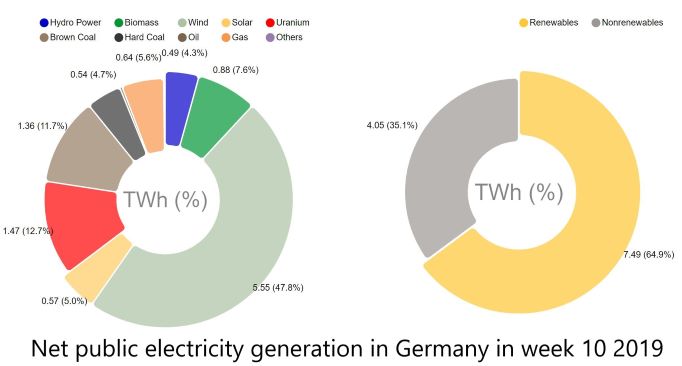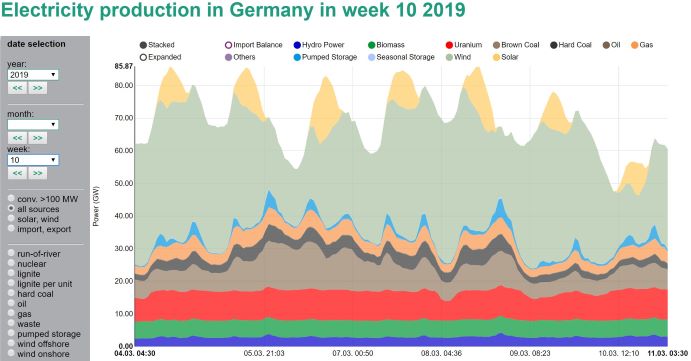

Renewable energy made up 64.8% share of electricity generation in Germany last week, according to solar research institute Fraunhofer ISE. The achievement was mainly due to strong production from wind facilities.
You must be wondering why this is a big deal. Well Germany has a target of reaching 65 % renewable energy for its electricity network by 2040, but it is already capable of reaching such levels albeit for shorter periods of time proved that it is close to reach the milestone.
For “week 10” of 2019, the week finishing on March 10 (Sunday), Germany sourced 64.8 per cent of its electricity generation from renewables. The bulk came from wind (48.4 per cent), with solar contributing 5.1 per cent, biomass 7.6 per cent and hydro 3.5 per cent. For the entire week, renewable energy made up almost two-thirds of Germany’s net electricity production – the figure actually supplied to end users and excluding power plant losses and on-site self consumption.


But that’s not all, if you throw in nuclear, and the share of zero emissions electricity sources reached 77.7 per cent for the whole week, in the biggest economy in Europe and one of the biggest in the world.
But now the challenge remains for Germany is replacing those solid red and brown lines at the bottom of the chart. Nuclear (in red) is due to be phased out by 2022, while all German parties have now agreed that brown coal (in brown) will be phased out by 2038.
Germany currently leads the world in the transition to renewables, although it faces stiff competition from the likes of Denmark, California, Hawaii, and the state of South Australia.
[related_post]
What makes Germany exceptional, is the sheer size of its grid, its dependence on an industrial economy, and its comparatively not-so-well wind and solar resources, which are vastly inferior to South Australia, for instance. Thus, the country offers vital lessons on grid stability and tolerance as renewables increase their total share.
This year has seen marked gains for renewable generation in Germany, with February seeing solar power contributing 20% more than it did it February 2018 and onshore (36%) and offshore wind (26%) also recording rises.
In the first ten weeks of the year, the share of renewables in net power generation totalled 43.3%, according to Fraunhofer ISE, up from a previous year’s 40.4% contribution. The data compilers said solar broke the 6% net generation benchmark earlier than ever this year, achieving that milestone in mid-February.
1. The mandate for blending Compressed Biogas (CBG) with natural gas has come into effect…
Andhra Pradesh is striving towards greening its energy sector with quite some speed. In a…
With an objective to bolster India’s green energy goals, a Tripartite Agreement has been signed…
The Union MNRE Minister Pralhad Joshi launched the Green Hydrogen Certification Scheme of India (GHCI)…
India’s energy conglomerate Bharat Petroleum Corporation Limited (BPCL) has commissioned a 5MW green hydrogen plant…
In a historical development, the European Space Agency (ESA) has successfully launched its pioneering ‘Biomass’…